Text


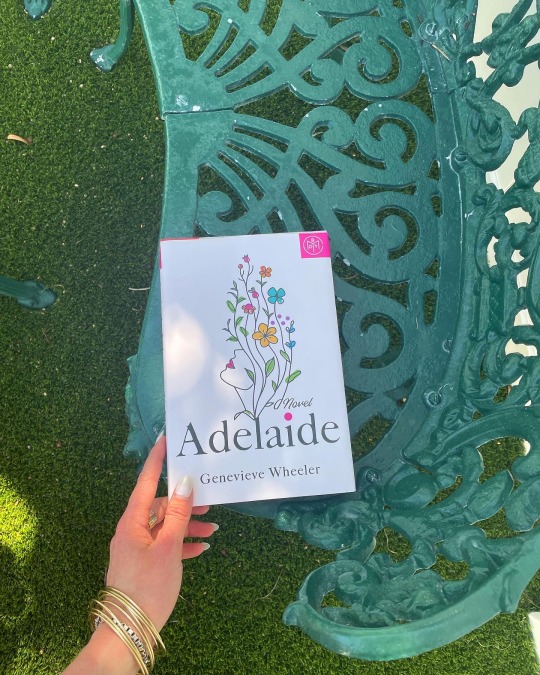




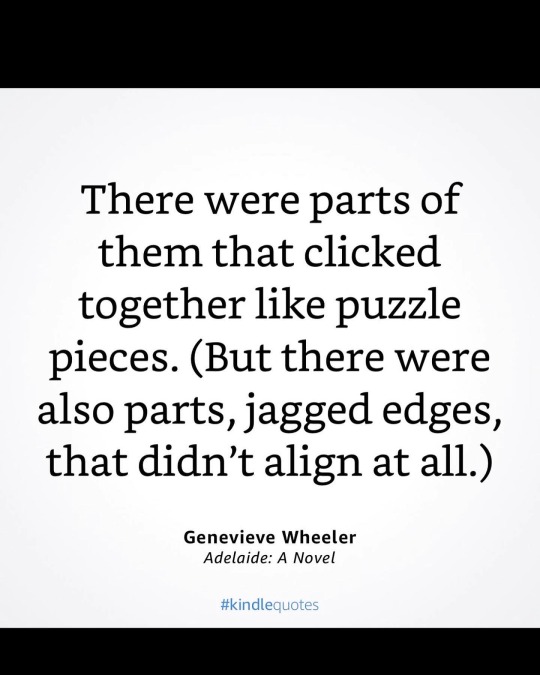
ADELAIDE by Genevieve Wheeler
⠀
3.8/5 stars🌟🌟🌟🌟
⠀
How could I not get disproportionately excited about Adelaide, a contemporary fiction debut recommended to fans of Stephanie Danler (an author whose cult I would join in 5 seconds if given the opportunity), with an alluring 4.21 stars on goodreads?
⠀
I admittedly expected something more haunting, something that left me aching and empty at the same time. Instead, Adelaide carries a Buzzfeed-y, deeply millennial undercurrent that, in my opinion, prevents the plot from reaching its full potential.
⠀
Adelaide is an empathetic, effervescent, outgoing American twenty-something, livelaughloving her way through life in glittery, sprawling London. She has wonderful friends, adventures galore (in the way you can only have adventures in your mid twenties), and she experiences, semi-regularly, the kinds of golden moments you wish you could freeze in amber.
⠀
One look at Rory Hughes, and Adelaide falls into the slow-motion-double-vision-in-rose-blush type of love typically reserved, again, for one’s mid twenties. She loves his looks, charm, accent…and, just maybe, how he treats her like she’s nothing.
⠀
I didn’t love how heavily Adelaide leans into millennial stereotypes. As a millennial, I think a lot of these stereotypes are rooted in some degree of truth, but Adelaide herself seems represent them in their most exaggerated form. She is a people pleaser to an unrealistic fault. She’s the sort of person who would organize a team building exercise after work, and think that everyone who shows up genuinely wants to be there. I can imagine her taking an “answer these 12 questions and we’ll tell you what your _____ is” quiz, and owning a mug that unironically says Girl Boss.
⠀
She doesn’t know how to take care of herself, but repeatedly bends over backwards to take care of Rory, who has the opposite problem: he knows exactly how to take care of himself, but is incapable of taking care of Adelaide.
⠀
It was hard to watch Adelaide get hurt a million little times. Her story holds quite a lot; I recommend it if you’re in the mood for a book that alternates between cute and dark, and willing to go into it with 0 expectations.
#books#book quotes#reading#book blog#bookstagram#Adelaide#book of the month#BOTM#Genevieve wheeler#contemporary fiction#book review
9 notes
·
View notes
Text

THE IDIOT by Elif Batuman
4.6/5 stars
The Idiot follows one Harvard freshman’s hilarious and honest journey to discover the true meaning of meaning by way of academia and/or email correspondence with an enigmatic senior from Russian class named Ivan.
She signs up for Russian, linguistics, literature, and psychology of language classes, absorbing and testing the alleged knowledge espoused by her professors in the hope that it will reveal, or at the very least point her in the direction of, meaning. Selin doesn’t like she doesn’t know what anything means; she can’t articulate what makes something mean anything. She hopes understanding the meaning of meaning will teach her about being a writer, about being in love, about purpose and value and beauty.
She quickly realizes, though, that learning anything of value in college is significantly harder than it initially appears (SPOILER ALERT if you are NOT FAMILIAR with the plot of ANNA KARENINA):
“It was hard to decide on a literature class. Everything the professors said seemed to be somehow beside the point. You wanted to know why Anna had to die, and instead they told you that nineteenth-century Russian landowners felt conflicted about whether they were really a part of Europe. The implication was that it was somehow naïve to want to talk about anything interesting, or to think that you would ever know anything important. I wasn’t interested in society, or ancient people’s money troubles. I wanted to know what books really meant.”
Another cold Boston morning, she is hit by the following realization that catalyzes her decision to skip class:
“One morning, on my way to a lecture on Balzac, it came to me with great clarity that there was no way that that guy, the professor, was going to tell me anything useful. No doubt he knew many useful things, but he wasn’t going to say them; rather, he was going to tell us again that Balzac’s Paris was extremely comprehensive.”
She is disappointed and confused by the break down in communication that exists between students and professors, as well as by the absurdity of the learning process, to the extremely amusing point where she entertains the possibility that meaning might actually be in math, not language. I couldn’t help but admire and sympathize with poor Selin as she quasi-valiantly grapples with a logic class called “Sets, Groups, and Topology:”
“When I tuned in, Tamás Pál (the professor) was talking about how it was impossible to trisect an angle. ‘This is probably counterintuitive,’ he said. I couldn’t imagine what it would mean for an angle to be impossible to trisect. If a thing existed, couldn’t you cut it in three?”
^relatable content
In Russian class, she meets Ivan: tall, dark, mysterious, Hungarian, a senior. Ivan is the first person at Harvard Selin is truly intrigued by; she senses they might have something deep - something of meaning? she wonders - in common in the ways in which they look at and interact with the world. Selin and Ivan begin an email correspondence, which begins innocently enough but ultimately culminates in Selin agreeing to spend the summer teaching English to children in Hungarian countryside villages.
Selin becomes addicted to the enigma of Ivan. She wants to understand him because she feels that there is something of her in him, yet she understands about half of what he tells her: “I felt dizzy from the sense of intimacy and remoteness. Everything he said came from so thoroughly outside myself. I wouldn’t have been able to invent or guess any of it.”
This book brought me right back to college. It’s a coming-of-age sort of novel told through the eyes of a fantastic protagonist. It almost feels like Selin keeps asking for a hammer in her quest to understand the world but is instead handed other tools that are of little to no use for her purposes: a screwdriver, a wrench, a bit of string.
She is sharp, thoughtful, kind, funny, and willing to accept anything anyone tells her until it starts to not make sense (which is where her humor comes in). I was cracking up on every other page, and turned the last page with 164 (!!) highlights.
The lightness of Selin’s experiences belie a dense, heavy underbelly of the novel that grapples with big questions and is ultimately a bit depressing. The reading experience is, I believe, captured in the below excerpt if one substitutes “The Idiot by Elif Batuman” for “Hungary:”
“Hungary felt increasingly like reading War and Peace: new characters came up every five minutes, with their unusual names and distinctive locutions, and you had to pay attention to them for a time, even though you might never see them again for the whole rest of the book. I would rather have talked to Ivan, the love interest, but somehow I didn’t get to decide.”
3 notes
·
View notes
Text
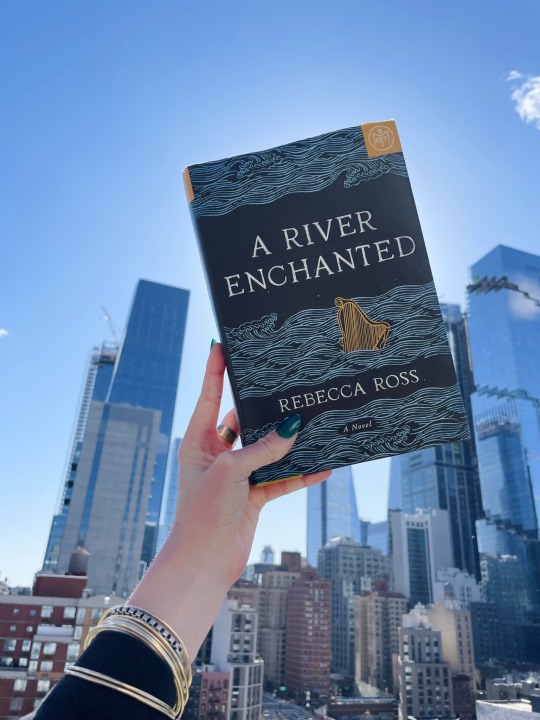
A RIVER ENCHANTED by Rebecca Ross
⠀
2.8/5 🌟🌟🌟
⠀
I don’t particularly enjoy writing negative reviews about books. However, I do particularly enjoy having a visual representation of the books I’ve read throughout the year laid out chronologically via the internet, and it is for that reason that I post this photo and this mini “I didn’t vibe with this book” review.
⠀
I didn’t vibe with this book. Its intriguing premise pulled me in straightaway, which I was obviously so excited about, but by 18-20% through my momentum slowed and my motivation slowed shortly thereafter in sad and slightly lagging tandem. I realized I’d thought that by 100-120 pages, the story would have progressed further than it had. That I’d care about the characters more, that plot would have skipped or twisted or jolted or done SOMETHING more than it had up until that point.
⠀
The experience of reading it felt like drifting along a lazy river in an inner tube during the middle of the summer - I was neither wholly bored nor wholly captivated. Parts of the journey were beautiful and interesting, but other parts had me swatting away mosquitoes and thinking, “This inner tube is getting hot and I’m kinda thirsty and my nose feels sunburned, I wonder how much longer until it’s over?”
⠀
While that is, I’m sure, probably up there with the world’s lamest and least scintillating metaphors, it does honestly encapsulate my feelings about the book. It never, in my opinion, needed to be 480 pages long. The characters were charming-ish but predictable, and the pace slowed down too much, too frequently. If your taste runs super parallel to mine, I’d save it for when you’re in the mood for a squarely middle-of-the-road experience, if you read it at all. And I don’t say that lightly, as I would normally consider this genre and premise to be exactly up my alley.
⠀
Have you read this one yet? Did the last book you read surprise you or let you down or make you feel some type of way you didn’t see coming?
#books#book quotes#reading#book blog#bookstagram#booklr#bookish#book review#booknerd#bookstagrammer#bibliophile#always reading#quotes#proseandpinotnoir#book lover#lit#fiction#book of the month#a River enchanted
2 notes
·
View notes
Text
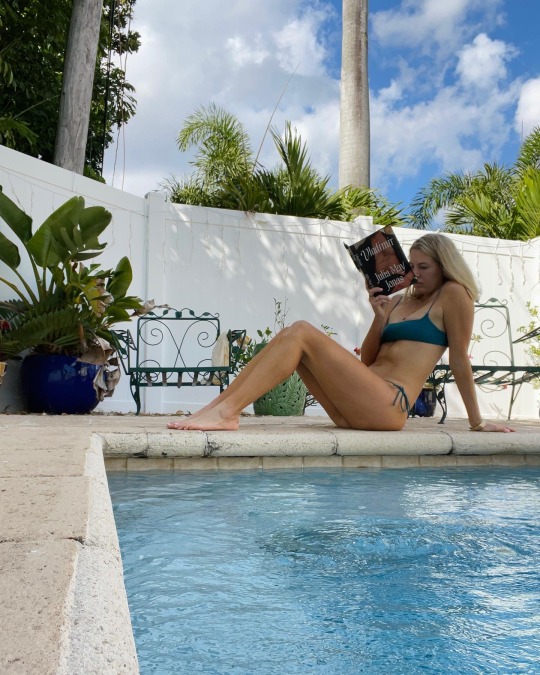
VLADIMIR by Julia May Jonas
⠀
4.3/5 stars 🌟🌟🌟🌟
⠀
What FUN to encounter a book narrated by a member of a demographic that I think is widely dismissed, mostly subconsciously, by much of our society:
⠀
OLDER-ISH WOMEN.
⠀
Post-menopausal women beyond the peak of middle age, who exercise often possess 100% of their mental faculty, yet who are no longer eligible candidates for one of America’s most cherished systems: the process by which women are objectified based on physical appearance and conditioned to conflate the results with self-worth.
⠀
These women - neither middle aged nor truly elderly - have simply aged out of the game. Which initially sounds like a good thing, BUT because the painful correlation between social relevancy and physical appearance (which prizes youth above all else) will likely always exist, the voices of this demographic are often minimized if not outright dismissed.
⠀
Our older narrator, whose name and exact age we never learn, is often grating, judgmental, vain, insecure, and/or pointlessly grandiose. Yet I can’t help but admire her because she tells her story - one we’re not supposed to care about - and forces the reader to care.
⠀
And at the center of her story is something associated with bravado when applied to men and shame when applied to women: appetite. The most evident theme in Vladimir to me is the female appetite. It’s about how women want and desire. The narrator, firmly labeled undesirable by all beauty standards - not just the modern ones - still desires. She desires Vladimir, yes, she also craves approval and youth and flavor. All desires she has been actively taught to suppress: she eats half portions, works out because she hates her body rather than cares for it, and worries about how her daughter perceives her.
⠀
As for the Vladimir element, I like that Jonas chose sexual appetite to be the primary form of desire put on frank display because all women, regardless of age, are potentially vulnerable shame or manipulation as it relates to having or acting on sexual appetite.
⠀
HIGHLY recommend to anyone looking for a creative, cynical, thought-provoking read about inverted social norms as they relate to gender and age!
#quotes#lit#books#reading#book quotes#lit quotes#literature#reading quotes#literature quotes#prose#nyc#new york#new york city#book of the month#booklr#book blog#book love#bibliophile#contemporary fiction#vladimir#julia may jonas
2 notes
·
View notes
Text

RUTHLESS FAE (Zodiac Academy #2) by Caroline Peckham and Susanne Valenti
⠀
3/5 stars 🌟🌟🌟
⠀
I know I’m not alone when I say this time of year can be BRUTAL. I’m trying to do everything I can to set up and prepare for the changes I want for myself in 2022 while simulanteously adjusting to the changes already swirling around me. January and February tend to bring a heightened awareness to the fragility of the line that separates what I can vs. can’t control. It’s easy to devalue the former (what I can control) and hyper focus on the latter (what I can’t) when I want to wrangle so many of my goals into existence by virtue of sheer force and willpower. (Honestly, people say “don’t force it” a lot; I’ve decided that applies to putting furniture together - unless it’s of the IKEA variety, then force away - but not always so much in terms of life. Sometimes - emphasis on sometimes - thinking what is meant to be will come hither means missing out on an opportunity fully within your grasp if you’re willing to be brave enough to apply just the right amount of pressure.)
⠀
As usual, my source of stability during times like these (dark times, Harry, very dark times) are books.
⠀
So this is a 70% “right um here’s what’s going on with me even though literally no one asked??” post and 30% Zodiac Academy review because 2022 is already so much different than 2021, whereas the second ZA book didn’t do THAT much more than the first did. But it’s giving me everything I want when I log off at night and slip into a fantasy world with slow burn romances and dragons and comic relief characters that have my cat jumping three feet in the air because I am CACKLING.
⠀
The plot of this series has thus far felt like a giant creaky wheel at an old grist mill (or something). I felt it struggle to turn in the first book. In the second, all of that potential energy finally released into something kinetic. The wheel began to move, the water lost its stagnancy. The romances took shape, as did the villains. I stayed up until 2 AM to finish it, which obviously means it’s not not a vibe.
⠀
I’m 40% through book 3, if that tells ya anything!
#books#book quotes#reading#book blog#bookstagram#bookish#booklr#book review#booknerd#bookstagrammer#bibliophile#always reading#quotes#proseandpinotnoir#lit#book lover#fiction#romance#New York city#nyc#nyc bookstagram#zodiac academy#ruthless Fae#zodiac academy 3
1 note
·
View note
Text
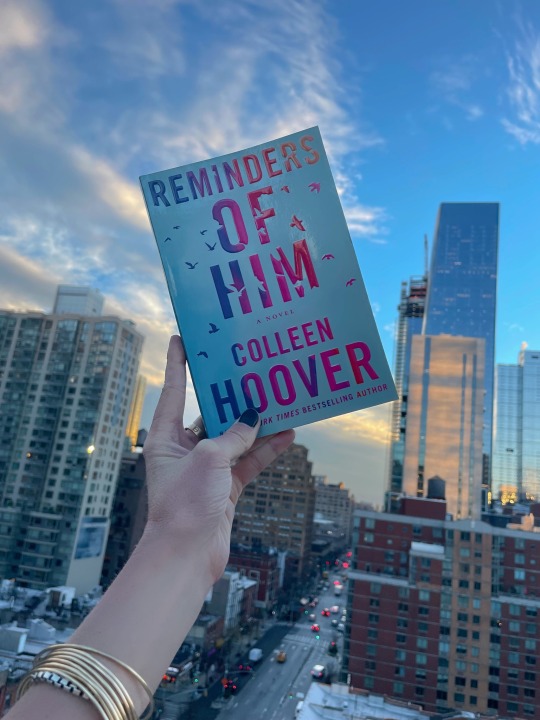
REMINDERS OF HIM by Colleen Hoover
⠀
3/5 stars 🌟🌟🌟
⠀
To read Colleen Hoover is, to some extent, to consciously agree to suspend reality for the duration of the novel. Which makes sense - she writes fiction. BUT. I personally struggle to endorse 300+ pages of a plot that almost exclusively revolves around an “I’ll do anything for you” relationship when its foundation was built upon one or two pages’ worth of intense instant chemistry and literally nothing else.
⠀
I believe in the instant attraction she writes about, but I personally don’t like when the relationships solidify without any sort of additional depth. I sometimes feel like I read chapter 1, start chapter 2, and wonder if I missed 15 chapters that were supposed to be wedged in between.
⠀
SO. Reminders of Him does feature that never-felt-like-this-before chemistry, but it was not the focal point of the novel. WHICH I LOVED. The romance was more of an added bonus to a plot that raised a bevy of moral and ethical dilemmas: Kenna is released from prison after serving five years for manslaughter. She’d lost custody of her daughter, whom she gave birth to at the beginning of her sentence and never even got to hold, and returns to the small town where she formerly resided - where her daughter currently resides - in the hope of being reunited in some capacity.
⠀
The issue? Kenna’s daughter lives with her paternal grandparents. Kenna was found guilty for the death of their son - the father of Kenna’s daughter - and, for a host of very valid reasons, they want nothing to do with her. Kenna connects instantly with a local bartender, Ledger, but their relationship becomes fraught with sadness and hurt and uncertainty when they discover each other’s identity. Ledger was Scotty’s best friend, and has been a surrogate father figure to Kenna’s daughter since she was born.
⠀
This book made me think about how much more inclined we are to be harsh or unforgiving or parochial when we’re hurting. Ledger’s character representes a gray area - he showed us what can happen when compassion and empathy mix with the sort of wounds that are never going away.
⠀
Have you read this one yet?! What’s your fave CoHo novel?
#books#book quotes#reading#book blog#bookstagram#bookish#booklr#book review#booknerd#bookstagrammer#bibliophile#always reading#quotes#proseandpinotnoir#lit#book lover#romance#fiction#reminders of him#colleen Hoover#coho#nyc#nyc bookstagram#New York city
7 notes
·
View notes
Text
“His smile ripples, shifts. Gone is the gentleman; again, the wolf.”
— V.E. Schwab, The Invisible Life of Addie LaRue
225 notes
·
View notes
Text

ZODIAC ACADEMY by Caroline Peckham and Susanne Valenti
⠀
2.5/5 stars but I’m really into it??
⠀
I’m writing this review of from the perspective of someone elbows deep in the second installment. You’d think that would be a testament to the strength of the first book, but it’s not. Book 1 is objectively bad. I saw one Goodreads user refer to it as “good in a junk food-wattpad sort of way,” which a) cracked me up and b) is accurate.
⠀
The writing isn’t great. The first third of it is super information heavy without a lot of depth, which seems oxymoronic but unfortunately isn’t, leaving much to be desired in terms of orientation within the world and familiarity with the characters.
⠀
Gemini twins Darcy and Tory are wrenched from their vaguely depressing mortal existence and thrown into the tumultuous world of Zodiac Academy, a school for - shocker - Fae who have magic powers, personalities influenced by their zodiac signs, and affinities for elements.
⠀
Darcy and Tory discover they are the rightful Heirs to the throne of Solaria; their real parents were the kingdom’s last king and queen until their apparently gruesome and mysterious murder. Post-unsolved regicide, the kingdom’s four most powerful families formed a Celestial Council and began to rule, grooming their sons to one day take their places. Max, Caleb, Darius, and Seth, as Heirs, are RUTHLESS and will do anything to ensure Darcy and Tory - the most powerful Fae the school has seen in years - don’t ascend the throne.
⠀
I decided to read Book 2 at the endorsement of two incredible friends whose reviews I trust completely: @marasantana17 (who gifted me this for my birthday - THANK YOU🥺😭💖) and @rachels.booksta, whose Zodiac Academy stories have been giving me LIFE these past few weeks. Both Mara and Rachel warned me this isn’t groundbreaking literature, but there’s a addictive sort of must-keep-going quality that makes it hard to put down.
⠀
I completely see what they mean: there’s a kernel of promise I can see burgeoning into something addicting, and I am therefore excited to continue my excursion into a rated R world that combines Avatar, House of Night, and The Magicians.
#books#book quotes#reading#book blog#bookstagram#bookish#booklr#book review#booknerd#bookstagrammer#bibliophile#always reading#quotes#proseandpinotnoir#lit#book lover#fiction#romance#nyc#New York city#zodiac academy
2 notes
·
View notes
Photo

Light by Dawn, Brighton, England.
📷 by Rock Cake.
197 notes
·
View notes
Text

RUNNING FOR MY LIFE: ONE LOST BOY’S JOURNEY FROM THE KILLING FIELDS OF SUDAN TO THE OLYMPIC GAMES by @lopez_lomong
⠀
Easiest 5 out of 5🌟 I ever gave a book
⠀
Running for my Life begins with an inconceivably horrifying atrocity: six-year-old Lopez is ripped from his mother’s arms by Sudanese rebels at Sunday church. The armed rebels had stormed the service in search of children to mold into soldiers to fight with them in the 2nd Sudanese civil war. They kidnapped every child in the church by force.
⠀
“Unsanitary” is too generous of a word to describe the tiny tent Lopez and the other stolen boys were packed into and confined within. The tent served as a toilet; there was nowhere near enough food, and what food they did receive was mixed with sand. Lopez watched boys go to sleep and not wake up again.
⠀
I don’t want to spoil the details of Lopez’s journey, which takes him from that tiny hut to 10 years at the almost-as-bad Kakuma Refugee Camp to Syracuse to the OLYMPICS, because the way he recounts his life is so full of hope and faith and determination it HAS to be read in his own words.
⠀
He used his grit and belief and athletic prowess (he ran 18 miles around the Kakuma perimeter daily, without shoes - like?!?!) to beat pretty much every single tidal-wave-sized odd: he was one of the few boys chosen to be adopted by an American family because of an essay he wrote. He graduated high school in time despite starting 10th grade speaking and reading English at a 2nd grade level. He earned a college degree. He became an American citizen. And then he became an Olympian in 2008, where he was selected out of 596 athletes to be our flag bearer🥺🇺🇸
⠀
This book made me sob and it also made me laugh. Mainly, I was just awed. Deeply awed and humbled. Lopez never once let his circumstances get the best of him. He had his faith, and he knew that all of his accomplishments would lift up a cause much bigger than himself. My mom and I are officially lifelong fans.
⠀
I barely scraped the surface of the rawness and resilience and joy within Lopez’s story. But this is a MUST READ. It’s stunning and powerful and one of the most gripping books I’ve ever read.
#books#book quotes#reading#book blog#bookstagram#bookish#booklr#book review#booknerd#bookstagrammer#running for my life#Lopez lomong#Nike running app#Nike running#nike run club#Olympics#track and field#Sudan#bibliophile#always reading
7 notes
·
View notes
Text
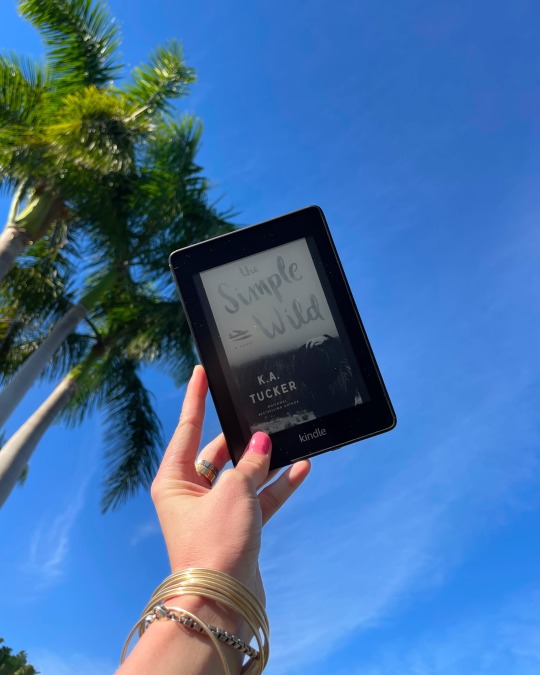
THE SIMPLE WILD by K.A. Tucker
⠀
3.8/5 stars ❄️✈️🌄🩺
⠀
TW: terminal illness
⠀
The Simple Wild should be the standard by which all enemies-to-lovers contemporary novels are measured. I can’t stand when two characters “hate” each other with a weird and unjustified intensity that exists to exclusively serve as fragile vehicle through which equally weird and unjustified sexual tension might rise to the surface.
⠀
In The Simple Wild, Calla and Jonah deeply dislike each other for a valid series of reasons: their respective values, upbringings, and outlooks on life don’t just differ - they fundamentally, aggressively clash.
⠀
Obviously the characters are going to be slightly exaggerated versions of who they may have been in real life for the sake of the plot, so it is with that in mind that I say both Calla and Jonah felt authentic in a true-to-form kind of way.
⠀
In case I am not in fact the last person on planet earth to read The Simple Wild, it’s worth noting here that while romantic, the book isn’t really a romance, per se. Privileged, I-need-my-soy-latte-every-morning-or-I’ll-die Calla returns to the place of her birth - the remote, no-one’s-ever-heard-of-it Bangor, Alaska - to spend time with her father, whom she hasn’t said a word to since she was 14, after learning he has been diagnosed with lung cancer. She struggles to reconcile years of pent up anger and resentment with the desire to get to know the man she realizes she never really knew, all while adjusting to the rugged, remote lifestyle demanded by rural Alaska.
⠀
I’ve seen this book around FOREVER and would not have picked it up if it weren’t for Margo choosing it as this month’s @thereadheadsbookclub pick. Listening to the episode was, as always, the absolute highlight of my day. The way Jackie read it particularly resonated with my own reading experience - if I were to scale The Simple Wild within its genre, it’s better than average. Obviously, my opinion would differ dramatically if this was supposed to be some sweeping work of literature, but Calla and her impractical fashion choices simply do not fit in to that particular vertical of fiction.
#quotes#books#bookstagram#bookstagrammer#booktok#booklr#book blog#book review#always reading#bibliophile#fll#fort lauderdale#kindle#the simple wild#ka tucker#calla x Jonah#thereadheadsbookclub#book club
4 notes
·
View notes
Photo

Chelsea Wolfe, from Birth Of Violence; “The Mother Road,” rel. c. 2019
17K notes
·
View notes
Text

LEGENDARY by Stephanie Garber
3.5/5 stars
HM. OK. Kicking off 2022 with an abundance of honesty: I know this won’t be a popular opinion since the second installment of the Caraval trilogy appears to be the booktok crowd favorite, but I didn’t love it as much as I wanted or expected.
I liked it, of course, don’t get me wrong - I love the whimsical, evocative way Stephanie Garber writes and I think Legendary delivers that in spades. There’s a delicate, arresting quality to her writing; the style is remniscent of a breath taken on the precipice of a momentum shift. The quick, instinctive inhale right before something surprising or magical or dangerous happens and tilts the world in a direction the characters hadn’t previously dreamed could exist.
But I didn’t love that the plot of Caraval - so novel and enchanting and addictive in the first installment - essentially repeats itself in Legendary, just from a slightly different angle and with slightly higher stakes. It was like a watered down version Katniss having to return to the arena in Catching Fire. I felt kind of “been there, done that, have no interest in wearing the tshirt…can we - what’s next?”
I also didn’t love that I was personally driven by one piece of the mystery that overpowered the rest. I was DYING to find out a certain character’s identity, and it was so consuming I got a bit sidetracked and lost sight of the book’s other, arguably weightier threads weaving themselves together. I take full responsibility for this aspect of my review because NOTHING distracts me like an enigmatic fictional man, and Stephanie Garber really knows what she’s doing in that particular vertical of YA fantasy.
Overall, I definitely enjoyed and will obviously be attending to the third ASAP.
#books#book quotes#reading#book blog#bookstagram#bookish#booklr#book review#booknerd#bookstagrammer#bibliophile#always reading#booktok#caraval#legendary#caraval series#caraval trilogy#stephanie garber
2 notes
·
View notes
Text
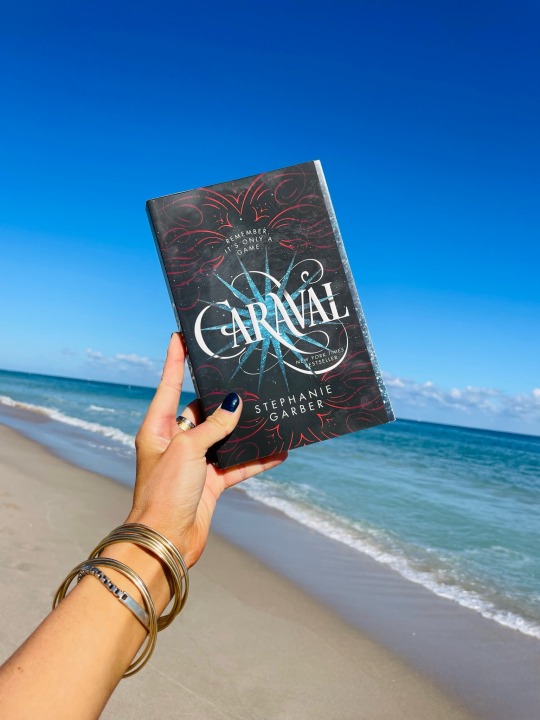

CARAVAL by @stephanie_garber
⠀
4.5/5 stars 🎪🎡🎠🎩🌹
⠀
I was FLOORED to learn this book came out in 2017 and I didn’t know it existed until a few weeks ago. I am so sus’ed out by myself I don’t even know what to do; there are truly no excuses for being so woefully ignorant of such a gem in the YA fantasy genre.
⠀
To briefly recap at least 17% of my personality: I LOVE ya fantasy. I love slow burn romances and that whimsically dark aesthetic where everything is emotionally heightened, more lurid and fantastic and imaginative, than (most of) real life.
⠀
Like Once Upon a Broken Heart, Caraval blew me away. Scarlett Dragna and her sister, Donatella, are invited to enter the famous, mysterious game of Caraval by its equally famous and mysterious gamemaster, Legend. Adventurous, break-the-rules-for-fun younger sister Tella thinks this is the perfect opportunity for her and Scarlett to escape their miserable lives and abusive father; cautious, protective, rule-abiding, quintessential-older-sister Scarlett is more reluctant to venture into a magical game that blends fantasy and reality so thoroughly it’s alleged to drive players to madness. But Tella goes anyway, and Scarlett has no choice but to follow.
⠀
What did I love about this book? First, it’s conceptually unique and fanciful without being frivolous.
⠀
Second, it’s about sisters, which I love because I think the bond between sisters is unlike anything else a person can experience in a lifetime. It’s a very real, grounding aspect within the otherwise uncertain, illusory world of Caraval.
⠀
Third, I LOVED the way color was written. Color is employed in such a delectably sensory way that it appeals to the tongue as well as the eyes: “She felt as if she could taste the red of the curtains. Chocolate cake drenched in wine.”
⠀
And color is linked to emotion, too: “The fire…[sent] a gray coil of smoke into the air, the color of things better said in whispers.”
⠀
All in all: so much to love. These characters, this world, the savory slow-burn romance…it adds up to an immaculately curated vibe and I can’t wait to read the second one.
#books#book quotes#reading#book blog#bookstagram#bookish#booklr#book review#booknerd#bookstagrammer#booktok#always reading#bibliophile#caraval#caraval trilogy#Stephanie Garber#Scarlett dragna#scarlett x julian
15 notes
·
View notes
Text
“Occasionally, there are minutes that get extra seconds. Moments so precious the universe stretches to make additional room for them, and this was one of them. People don’t get pauses like these very often. Some people never receive them at all.”
— Stephanie Garber, Finale
131 notes
·
View notes
Text
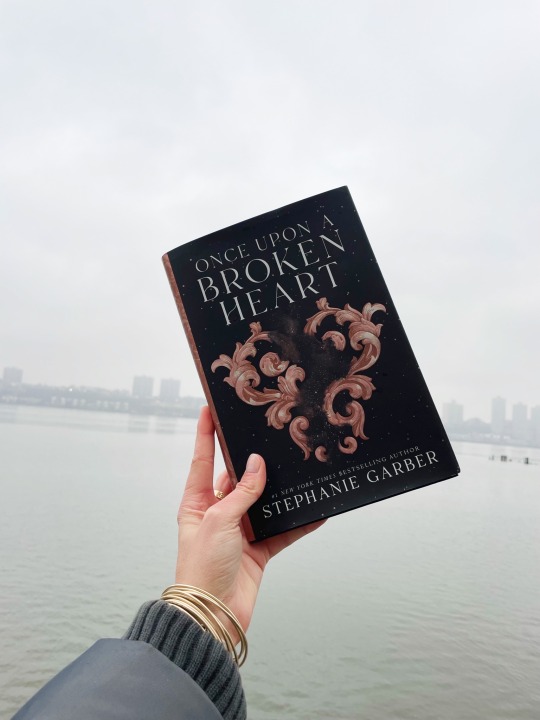
ONCE UPON A BROKEN HEART by Stephanie Garber
⠀
4.7/5 stars💔🔮🪄🍎🌟
⠀
First, I need to say THANK YOU to @goodreadsgraceandalice for writing the world’s best review of this book. I dropped everything I was doing once I read Grace’s thoughts and AS USUAL she introduced me to a new favorite.
⠀
EVERYTHING about Once Upon a Broken Heart is whimsical and evocative and something I viscerally want more of - the writing, the worldbuilding, the characters. The book itself is delicately hopeful at times and seductively dark at others. It finds its footing in the magic of fairytales and brims with all the best elements of romance: Character A’s gaze snaps to Character B’s, words with hard edges are belied by a crack in a facial facade, feigned indifference is betrayed by a touch that ignites where it should quell.
⠀
Evangeline knows she’s likely making a big mistake, but, driven by the consuming force of her heartbreak upon discovering the boy she loves is engaged to her literal stepsister, she prays to the Fated Prince of Hearts in a desperate attempt to stop the wedding.
⠀
Jacks, the Fated Prince of Hearts himself, represents unrequited love; the stories say only his one true love can make his heart beat again, and his kisses, which are allegedly worth dying for, are fatal to all but her. He’s got that It™️ factor that I love in fictional men, which the highest compliment I can bestow on anyone ever and I shall leave it at that.
⠀
And so Evangeline strikes an ill-fated bargain with Jacks: she has to kiss three people of his choosing, at times and places also of his choosing, in exchange for his stopping the wedding. Evangeline soon realizes she may have stepped into something much bigger than her broken heart, and the games begin.
⠀
Jacks is my new morally grey fictional king. The descriptiveness with which Stephanie Garber writes about his character is legitimately fictional ASMR. But what I really loved was that plot does not rely on the allure of Jacks (or any one character) to hold itself up; it’s cohesive and magical and compelling, and left me NEEDING more.
⠀
Have you read this (or Caraval) yet? Who’s your most recent fictional crush? ⬇️
#once upon a broken heart#uoabh#Stephanie Garber#bookstagram#bookstagrammer#bookstagramming#booklr#book blog#bibliophile#books#reading#quotes#book quotes#jacks#prince of hearts#jacks x evangeline
7 notes
·
View notes
Text

MY BODY by Emily Ratajkowski
⠀
2.4/5 stars 🌟🌟
⠀
I have a lot of issues with this book of essays, all of which derive from its inability to decide what it is and what it’s trying to say.
⠀
There are underpinnings of what has the potential to be strong feminist theory: “In my early twenties, it had never occurred to me that the women who gained their power from beauty were indebted to the men whose desire granted them that power in the first place.”
⠀
I think that excerpt carries a lot of power. I think it becomes even more interesting when contextualized with the bits and pieces of her childhood she chose to tie to it. For example, not only did Emrata know she was beautiful at a young age, she knew certain parts of her - her body, her beauty, her sex appeal - were things she could monetize. She objectified her own body so that she might commodify it. There is a certain degree of autonomy in doing so, but at what cost? And to what extent? After all, to commodify the female body in this day and age - NFTs aside - IS to objectify it.
⠀
But instead of adding her inimitable perspective to the overall concept, Emrata spends too much of the book on the “my parents told me I would have to work twice as hard because I was hot” line of thinking. There are so, so many people all over the world who have to work twice as hard - three, five, ten times as hard - because of oppression or bias or discrimination or prejudice. I therefore find it extremely difficult to summo sympathy for anyone claiming to feel oppressed from “pretty privilege.”
⠀
But I haven’t lived Emrata’s experience and am not here to question the validity of it. While I don’t doubt she has been treated differently in certain circles because she is internationally recognized first and foremost as a Hot Girl™️, I personally am not interested in reading an entire book about it. Nor do I think writing a book about it is a radical feminist act.
⠀
And so, I am torn. Emrata clearly wants to speak to women everywhere, but 70% of this book was so out of touch it’s laughable she purported to do so in the first place. I’m kind of let down and annoyed, which is exactly why I *usually* avoid celebrity books🤠
#books#book quotes#reading#book blog#bookish#bookstagram#booklr#book review#booknerd#bookstagrammer#emily ratajkowski#my body by Emily ratajkowski#Emrata#my body#feminism#essays#botm
9 notes
·
View notes